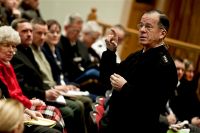WASHINGTON, Feb. 10, 2011 — If the military takes care of its people and their families, then the future will be assured no matter what it brings, the chairman of the Joint Chiefs of Staff told students at the Army War College today.
Navy Adm. Mike Mullen spoke at the Commandant’s Lecture Series at Carlisle Barracks, Pa. He told the students that they cannot underestimate the scope of the change the military has been through in the past 10 years.
“We’re depending on leadership in these extraordinarily challenges times,” he said. The past decade has changed the services and now is the time to sort through that change to answer the question of “who we are right now,” he said.
The military has gone through rough times in the past decade, he said. He challenged the students to examine the change and see if “the ethical compass is true, is our overall compass true? Where are we going in the future? What have our young ones … learned about us that we need to address as leaders, and what do we need to teach them as they mature? Are we keeping our best young officers?”
The chairman said that as budget time approaches, most people measure it in the missions given and the equipment bought. “The missions and stuff make no difference in our health in the future,” he said. “(Our future is) guaranteed in terms of good health if we keep the right people.”
One fundamental change in the military over the last decade is the role that military families have played and the relationship of the services with those families. He said a ground forces junior officer in 2001, has probably deployed five or six times in the past decade, forcing families to cope with long absences.
The services have put in place programs to help families and redeploying personnel. But as budget pressures begin to grow – and they are growing now, Mullen said – the family programs are the first to unwind.
“I don’t want to do that,” he said. “I think we would do that at our peril. The challenges keep coming and we can’t seem to get them off the plate.
In yesteryear an issue would come up, we’d deal with it as a country and we’d move on,” Mullen added. “Now the plate isn’t getting any bigger, but they won’t go away. You as the future leaders of our military must understand it.”
The chairman discussed the nature of the change and the issues around the world. He told the students – almost all of whom served multiple deployments in Iraq and Afghanistan – that the military must continue to change and adjust.
He said they need to examine all of the world. The preponderance of resources today flow to U.S. Central Command, Mullen said. As it should with American troops are involved in two conflicts there. “But this means there is an inability to invest in small ways in other parts of the world, and if this continues, this can be very dangerous,” he said.
He told the students that American forces will be out of Iraq at the end of the year, and said those who served there should be proud of the work they did. “There is a night and day difference every time I visit,” he said. Iraq has formed a government and they are dealing with politics and not with war as they move forward.
The major U.S. effort is now, of course, in Afghanistan. “In a very tough fight, but it’s better there,” Mullen said. “But as I said many times it’s not just security, there has to be a level of legitimacy in the government of Afghanistan. That’s got to be created over the next three to four years.”
Mullen also praised the efforts of Army Lt. Gen. William Caldwell’s NATO Training Mission in Afghanistan. He said they have built the training infrastructure, trained the instructors and developed the curricula for the Afghan Army and police. “On average we have 30,000 to 35,000 trainees at one time,” he said. “Two years ago that number was miniscule.”
This was Mullen’s third trip to the Army War College, and he spoke of his 43-year career. “To cycle from the war we were in when I was first commissioned, to the wars we are in in the last decade in a position of leadership has truly been an extraordinary opportunity,” he said. “It’s been a great ride.”
Source:
U.S. Department of Defense
Office of the Assistant Secretary of Defense (Public Affairs)

 von
von 